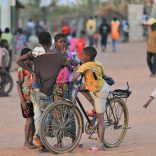Mozambique: Meet Vovó Cecília, who runs a mobile library in Mafalala at the age of 75 - Watch
Norway renews UNODC support with US$3.1 million investment in Mozambique’s justice and counter-organized crime sectors

Photo courtesy: Royal Norwegian Embassy in Mozambique and UNODC
The Royal Norwegian Embassy in Maputo and the United Nations Office on Drugs and Crime (UNODC) have signed a new agreement extending their cooperation in Mozambique through 2028. The programme will continue supporting national institutions and community actors in responding to organized crime, terrorism, gender-based violence, and other complex challenges that undermine justice, security, and the rule of law.
The renewed commitment, valued at NOK 31.7 million (USD 3.1 million), builds on a partnership that began in 2020, when Norway became the first international partner to support the establishment of UNODC’s presence in Mozambique. Norway’s early engagement helped lay the foundation for sustained collaboration on justice and security.
Since then, Norwegian support has helped strengthen Mozambique’s justice sector across institutions and communities. These efforts have been guided by the Maputo Roadmap, a strategic framework aligning UNODC’s technical assistance with the priorities of the Government of Mozambique to deliver coordinated, sustainable impact across law enforcement, the judiciary, and civil society.
“Norway’s continued support is a clear demonstration of the impact we’ve achieved together with our Mozambican partners over the past five years,” remarked Antonio De Vivo, Head of the UNODC Office in Mozambique.
“This agreement reflects Norway’s long-standing commitment to multilateralism, peacebuilding, and inclusive governance,” said Sissel Idland, Minister Council at the Norwegian Embassy. “It shows how important international partnerships are in helping countries like Mozambique tackle serious security threats, while also promoting justice, human rights, and the rule of law,” Idland added.
Responding to new and emerging security threats
To strengthen the capacity of justice institutions to respond to the serious and evolving threats of terrorism, cybercrime, and trafficking, UNODC has delivered targeted assistance through training, national and international coordination to more than 40 national institutions, with Norwegian support.
Mozambique’s ability to stop illicit flows is growing, with cocaine seizures surging from 78 kg in 2023 to over 1,990 kg in 2024, and methamphetamine seizures rising from 125kg to 467kg in the same period, and a 5-ton ivory bust at Maputo Port. While reflecting increased flows, these results highlight Mozambique’s strengthened capacity to confront organized crime, bolstered by UNODC’s continuous support.
In April 2024, it expanded its field presence with the opening of a fully operational office in Pemba, enhancing its capacity to provide more timely and tailored support in the field of terrorism and organized crime to the conflict-affected province of Cabo Delgado and other regions in the north.
Combating financial and environmental crime
The programme has strengthened national responses to illicit finance by training financial investigators to detect and address money laundering and terrorism financing. Environmental inspectors, prosecutors, and judges have gained specialized skills to tackle environmental and wildlife crimes more effectively. At the same time, the development of strategic anti-corruption frameworks and related training has aimed to reduce institutional vulnerabilities, strengthening resilience against organized wildlife crime groups.
Reaching communities at risk and cross-border coordination
Community-level prevention of human trafficking has remained a cornerstone of the programme.
Over 1,500 people in key settings – including schools, bus terminals, and markets – were reached through in-person awareness campaigns, supported by social media and national TV spots to inform and protect vulnerable communities. In parallel, training has strengthened frontline institutions’ ability to detect, report, and respond to trafficking cases. Reflecting growing cooperation between UNODC and the Government of Mozambique, the country became the 46th globally – and second in Southern Africa – to join UNODC’s Blue Heart campaign, signalling high-level political commitment to ending trafficking.
Cross-border cooperation has also advanced, with Mozambican authorities engaging counterparts in South Africa, Eswatini, Angola, Brazil, and Portugal to improve joint responses to trafficking and organized crime. Meanwhile, drug use prevention efforts have targeted youth and educators in Cabo Delgado, Maputo, Beira, and Zambezia, including through the reactivation of peer-led anti-drug units in Maputo schools.
Addressing gender-based violence
UNODC has expanded its work on gender-based violence by improving coordination among health services, law enforcement, and civil society. In 2025, a nationwide, free-tocall digital platform was piloted, reaching over 10,000 listeners in its first month with information on warning signs, reporting mechanisms, and available support. This innovative tool, aiming to tackle widespread underreporting of gender based violence cases, complements broader efforts to strengthen institutional responses and raise public awareness.
Advancing prison reform and expanded access to justice
Initiatives to accelerate prison reform have led to improved hygiene and facility management, while correctional staff have received specialized training and inmates have been engaged on their rights and responsibilities, strengthening Mozambique’s implementation of the Nelson Mandela Rules. In 2025, national institutions jointly committed to the application of alternative measures to prison in a UNODC supported seminar. Applied to their full extent, such measures are expected to produce a decrease in prison overcrowding of up to 23% over the next two years.
Such support in the field of prison reform has been matched by efforts to bring justice services closer to underserved communities, with legal aid fairs in remote districts such as Cabo Delgado reaching over 1,050 people in 2024 and 2025 with essential legal information and support.
Protecting infrastructure and promoting integrity
In response to insurgent threats, UNODC has trained police officers, prosecutors, and officials from the National Institute of Disaster Management and the Atomic Energy Agency to strengthen the protection of critical infrastructure. At the same time, it has reinforced institutional integrity through anti-corruption and ethics training for judicial and oversight bodies, supported by the dissemination of a Code of Ethics for judges — contributing to stronger governance and accountability across the justice sector institutions.
Looking ahead
The 2026–2028 phase will deepen efforts to confront serious security threats, expand access to justice, and reinforce the institutions that safeguard accountability, stability, and the rule of law through further training, awareness-raising and institutional support.
Building on extensive training made possible with Norwegian support, UNODC’s follow-up programmes will aim to further strengthen the skills of law enforcement and criminal justice officials, aiming to further improve the quality of criminal investigations and prosecutions, particularly in organized crime cases.
At the same time, the judiciary will receive support to strengthen internal oversight mechanisms, promoting greater accountability and integrity across the justice system
In parallel, and in the context of Mozambique’s efforts to exit the Financial Action Task Force grey list, UNODC will continue to provide technical assistance to financial crime investigative units and anti-money laundering/counter-terrorist financing bodies. This support will help ensure that Mozambique has the capacity to detect, investigate, and address financial crimes, strengthening the integrity of its financial system.
“We look forward to three more years of UNODC-Norway cooperation, steadfast in our support to Mozambique in strengthening its law enforcement and criminal justice systems so that it can respond effectively to crime and terrorism, safeguard human rights and lay the foundations for lasting peace and justice”, said De Vivo.












Leave a Reply
Be the First to Comment!
You must be logged in to post a comment.
You must be logged in to post a comment.